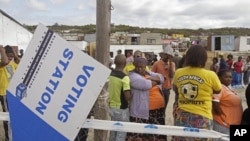South Africa’s Democratic Alliance is celebrating significant gains in this local government election over its performance in 2006. Support for the African National Congress was slightly down but the party continues to convincingly dominate politics in the country.
The Democratic Alliance, or DA, increased its support nationally among voters from about 15 percent in 2006 to around 23 percent this time around - an achievement it is already hailing as a gain for democracy in South Africa. Lindiwe Mazibuko, the DA’s national spokesperson told eNews television her party was unique in increasing voter support.
“And that is something to celebrate because it means we are moving towards a situation where people will feel like they have choices, a choice between two parties which have government experience, and which have a service delivery record to be challenged on, when election time comes around, and that can only be good for our democracy,” said Mazibuko.
After the local government election in 2006, the DA needed to form a coalition to govern the country’s so-called mother city, Cape Town. This time around the DA has won an outright majority.
In Nelson Mandela Bay, in the heartland of African National Congress support, the DA increased its support to 40 percent from 25 percent.
The big loser in this election is the Inkatha Freedom Party, or IFP, whose support is predominantly confined to the Zulu-dominated Kwa-Zulu Natal province. The IFP has lost significant support to the new kid-on-the-block, the National Freedom Party or NFP. The NFP split from the IFP last year.
Traditionally in South Africa, local government elections have a much lower turnout than national elections of less than 50 percent. In the 2006 election, only 48 percent of voters exercised their right to vote, but the Independent Electoral Commission says this time the turnout is well above fifty percent.
Some of the DA’s success comes from its merger last year with the Independent Democratics whose former leader, the feisty Patricia de Lille, is now the mayor-elect of Cape Town. De Lille brought with her to the DA significant support from the mixed race voters, particularly in Cape Town and other areas of the Western Cape province.
But the DA, which has its roots in the apartheid era liberal progressive party, has also won support in black communities taking several wards across the country from the ANC.
Democratic Alliance Shows Significant Gains in South African Election
